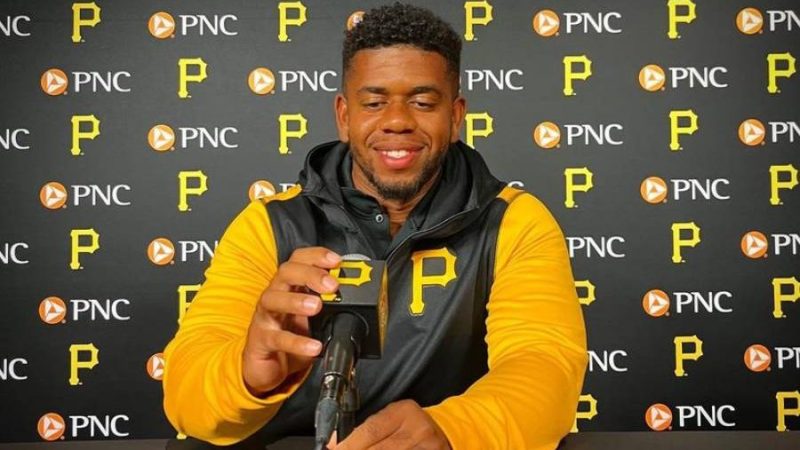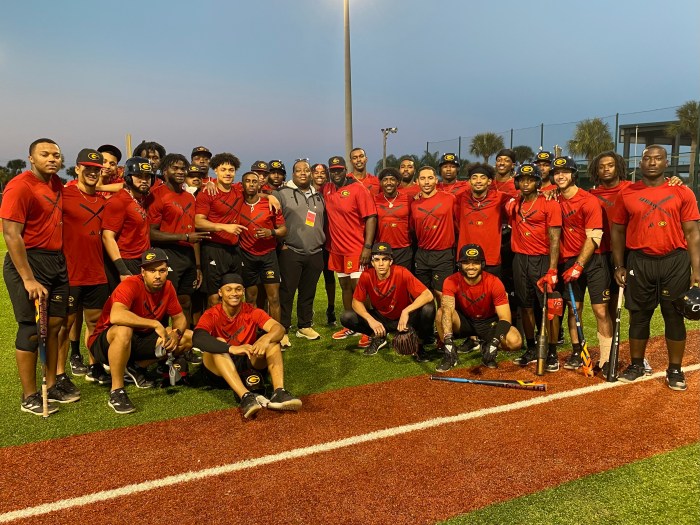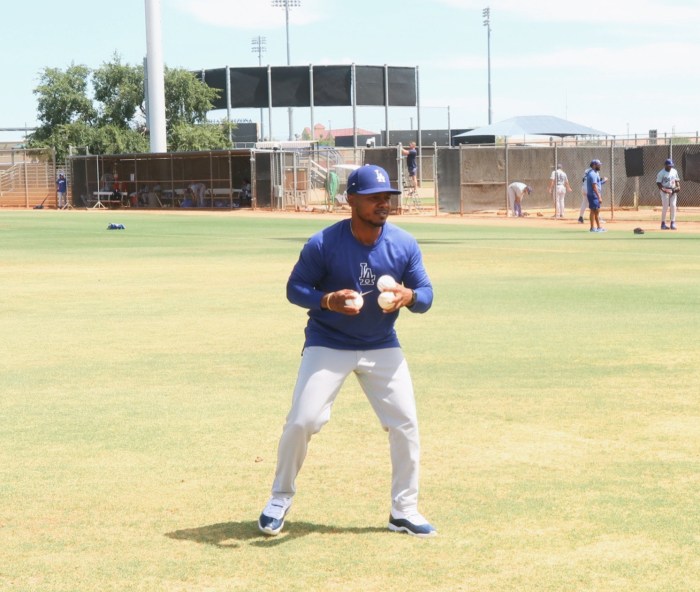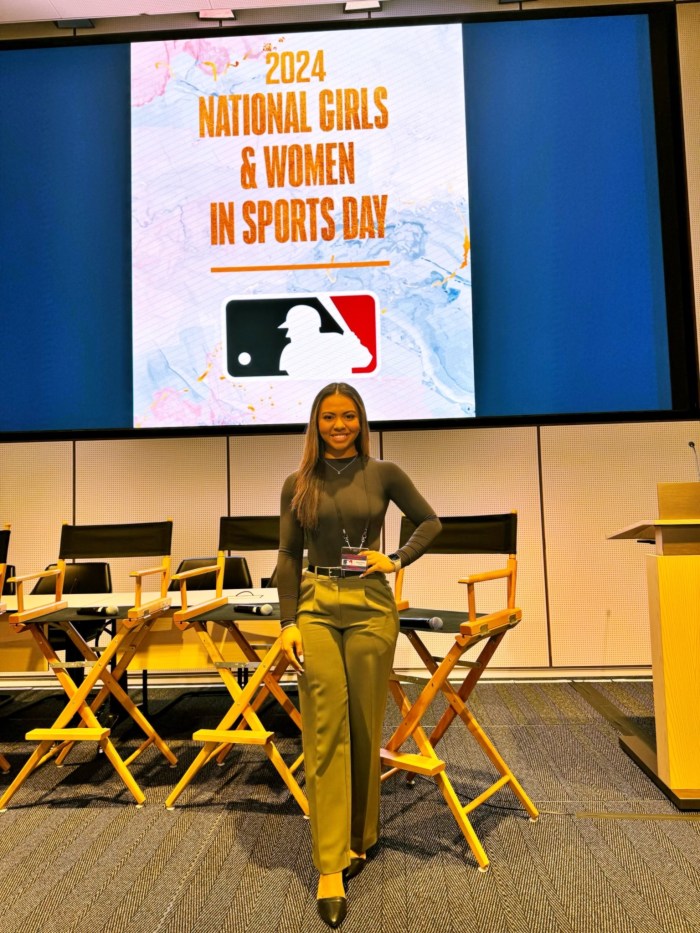Up Next
Former HBCU baseball and softball players find pro sports careers off the field
Athletes from historically Black colleges land roles in major league front offices through diversity development initiatives

When former Alcorn State University outfielder Brandon Rembert graduated from college in 2020, he hoped to play professionally. But after the coronavirus pandemic shortened the MLB draft to only five rounds that year, Rembert found a new path into pro baseball through an fellowship with the Pittsburgh Pirates as a part of MLB’s Diversity Pipeline Scout Development Program.
“I never thought about scouting. I never thought about working in player development. Like, I had my mind on wanting to play,” Rembert told Andscape. “It was a tough transition because I felt like my dreams were, like, crushed. … I’m still in professional baseball, just on a different side.”
Like Rembert, other former baseball and softball players from historically Black colleges and universities are finding a home in MLB front offices and hoping to open additional pathways for HBCU graduates to enter leadership positions with the league.
“I feel like that my grind started when I first started working for the Pirates,” Rembert said. “Just like, new guy, 23 years old, just starting out, just trying to make a name for myself and, like, move up the ranks, and it was just a lot of work.”
After starting as an operations assistant with the Pirates at the end of his 18-month fellowship, Rembert earned a full-time role as a scout. His daily workload includes doing a full breakdown of collegiate and high school players his team could potentially draft, and during baseball season, Rembert spends much of his time on the road talking to players.
“Different people get different starts. The main route for a lot of scouts is, like, they played professional baseball and maybe they coached at a high level and wanted to go into the scouting space. … It’s all about who you know, at the end of the day,” Rembert said. “It’s about relationships, [and] the MLB is, like, it’s such a relationship-driven business.”
Everything Rembert learned as a former collegiate baseball player in the Southwestern Athletic Conference have helped him transition from athlete to scout.
“Since I was a kid, like, I’ve always been evaluating players at the back of my head. … Now I get paid to do it,” Rembert said. “So, like, even when I was playing at Alcorn, I was always evaluating players because I was always trying to find a competitive advantage. I was always evaluating players to see what they did well [and] what they didn’t do well so I could beat them.”
A diversity program with the Atlanta Braves helped Tyrone Brooks, the senior director of MLB’s Front Office and Field Staff Diversity Pipeline Program, enter the league in 1996.
When the MLB started the Front Office and Field Staff program in 2016, Brooks knew he wanted to help others break into baseball.
“We’re making inroads as far as helping to get people into the industry, especially persons of color, and looking at what opportunities are out there,” Brooks said. “We just noticed there wasn’t enough completely out there, and that’s where part of my role is helping to be a conduit working closely with the 30 major league clubs and helping them in identifying talent.”
Brooks said he recommends candidates when teams have jobs available, and offers help in other ways.
“Also a big part is providing that support for individuals as they’re looking to make their way into the game and help them to hopefully live their dream and do something that they’re going to want to do and love for the next 25 to 30-plus years,” he said.
Over the last few years, many participants in the three classes of MLB diversity fellows have landed permanent jobs after completing their fellowships, he said.
“There’s all different ways for individuals to make their way in, and from the fellowship standpoint that has been probably our most successful way for folks to get fully entrenched within the front office,” Brooks said. “We’ve had over a 90% success rate of individuals coming into the program and getting hired in full-time roles beyond the fellowship.”
Like Rembert, former Grambling State University infielder Jalen Heath also benefited from the program. Heath, who graduated from Grambling State in 2019 with a bachelor’s degree, worked in accounting before returning to the sport he loved.
In college, he would follow draft trends and the transaction pages of his favorite MLB teams, but he didn’t know opportunities in baseball front offices existed until he met Brooks.
“I was set on just working, getting a job and having a career in accounting,” Heath said. “I just wouldn’t be getting the same fulfillment out of it that I wanted from my career and my work. I missed baseball. It was a big part of me that was just kind of gone, so I kind of wanted to get back into it, be around it and make an impact that way.”
Heath is an operations assistant with the Pittsburgh Pirates. He spent the first year of his 18-month internship working in player development with the organization’s minor league team. Now he assists with monitoring MLB rules and transactions.
“You want to be a sponge about everything,” Heath said. “It’s one of the things where you have to be humble [because] it’s hard to know everything coming in … and so I think I’ve been blessed to have a pretty good support system around me with the Pirates and people in our organization who [I] can lean on and ask questions, ask for guidance and kind of help me train myself to be a better baseball professional.”
Although Heath is still in the internship, he also works with Brooks and participates in Zoom calls and panels to encourage former HBCU students and student-athletes to pursue a career in pro baseball.

Jalen Heath
“The ones that are interested, I try to reach out to them and answer any questions they may have or give them some advice. I try to tell them it’s a busy schedule for baseball,” Heath said. “I definitely just want to be available and be around to give back and do my part of supporting and fostering a culture of HBCU athletes breaking into the game of baseball and at the professional level, whether it be on the field or off the field.”
Former University of Arkansas Pine-Bluff infielder Braelin Hence comes from a strong baseball background. His father, Marvin Hence, played baseball, and his brother, pitcher Tink Hence, plays for the Springfield Cardinals, a Double-A affiliate of the St. Louis Cardinals.
“[My dad] played the game for a long time. I feel like you learn what you learn because of the people around you. So, my dad being such an advocate of baseball, I won’t say I didn’t have a choice, but even if given a choice, I still would have picked up baseball,” Hence said. “It’s been my first love. … It’s been something that has given me a lot of fulfillment in life. It’s kicked me down at times, but at the same time it’s picking me right back up.”
After a hip injury forced Braelin Hence to retire from the sport, he unofficially became an assistant coach at UAPB, and helping his former teammates inspired him to pursue a different career in baseball.

Taylor Terrell
“I always had dreams of playing baseball. But, you know, certain things happen in life where it opens your eyes to new things and new possibilities,” Hence said. “So once the door was open, it was something that I knew I had to walk through. It was something I knew I wanted to work through. So it just became first nature to me, like, seeing another guy chase his dreams, and being able to help that and assist with that has been one of the most fulfilling things ever.”
At 24, Hence has a summer internship with the Los Angeles Dodgers organization. He loves working with players who are the same age as him and those who are younger.
He collaborates with coaches and players daily to determine ways to enhance their progress. He helps with scheduling practices, works with players on drills, equips batting practices and learns more about the technology side of the game.
“Just the ability to learn from working with players every day, all from different ethnic backgrounds, you learn more about the game from players than you’ll probably ever learn on your own,” Hence said.
Hence isn’t the only UAPB alum interning with the MLB this summer.
Alyssa Wesley, a former outfielder for Arkansas-Pine Bluff’s softball team, knew that once she graduated from college, she wanted to work for either the NFL or the MLB. Attending the NFL’s HBCU Careers in Football Forum in December 2022 “opened up my eyes” to how she could have a career in sports, she said.
“I was like, now that I got a sniff of it … this is what I was meant to do,” Wesley said.

Alyssa Wesley
At the urging of her friends, Wesley applied to the MLB’s summer internship program. She is currently the MLB’s baseball and softball development intern and works with the league office. As a part of her internship, she worked with the MLB for its first baseball and softball joint event, advises young girls on their college recruitment and how she landed an internship with the league.
“I’ve actually stayed connected with them, even [the] last couple days, just giving them advice on anything that can help them grow their careers, whether it’s on the field or off the field, whether it’s in the office or not,” she said. “So it’s really special to kind of keep giving back to the game because the game gave me so much playing.”
After she graduated from college in 2022, Wesley spent one season with UAPB’s softball program as a graduate assistant coach, which has helped her in her new job.
“It’s kind of funny, like, seeing the difference between inside the white lines and outside of white lines. … Since I played, then I also had coached, to now working in a front office for a major league corporate office, you definitely see the levels to everything,” Wesley said. “Just hearing the ideas on what they can do to not only just grow baseball but also grow softball is really special, too.”
Wesley’s summer internship ends in August, but she knows she wants an MLB career. During her time with the league office, she has built relationships with people in multiple departments.
Ultimately her goal is to get a full-time job in an MLB front office and continue to represent HBCU graduates working with the league.
“I feel even more proud to be a UAPB graduate, especially working at MLB. I want to put that HBCU on the map,” Wesley said. “I think every HBCU should be proud of that. … I think it’s real special to show what we’re doing and showing that people like us can do it. It doesn’t just have to be a dream. This is actually really possible.”
